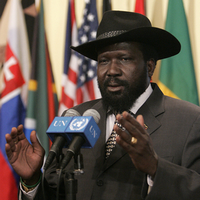JUBA, Sudan -- Almost a month ago, the Sudan People's Liberation Movement (SPLM), Southern Sudan's ruling party, convened all of the South's registered political parties for a conference designed to promote Southern unity ahead of the region's looming self-determination vote, scheduled for Jan. 9. The vast majority of Southern Sudanese favor secession, and politicians as well as everyday citizens seem to agree on the need for consensus during the South's "Final Walk to Freedom," as a billboard in the Southern capital of Juba calls the countdown to the referendum. However, despite the conference's goal, persistent rifts among the South's political factions remain, and are likely to pose a challenge to the SPLM as it prepares to transform a five-year-old semi-autonomous regional government into the world's newest state.
The conference was by most accounts successful in its primary aim of bolstering support for the idea of a united South, reflecting the overwhelming priority that the SPLM -- and the international community -- has placed on ensuring a credible, peaceful and transparent referendum. As such, it was the first public-relations victory in the SPLM's ongoing reconciliation campaign. Further progress on this front will be a harbinger for what to expect in the key period following the referendum, when Khartoum will likely be forced to swallow the bitter pill of an independent and oil-rich South.
Sudan's elections last April -- the first held nationwide since 1986 -- exposed the underlying divisions within the South, some of which stem from discontent with the SPLM's leadership of the Southern government, formed following an internationally brokered North-South peace deal in 2005. The rifts were exacerbated in the aftermath of the disputed April polls, resulting in the emergence of several armed rebellions against the Southern government in the most strategic zones of the South.

